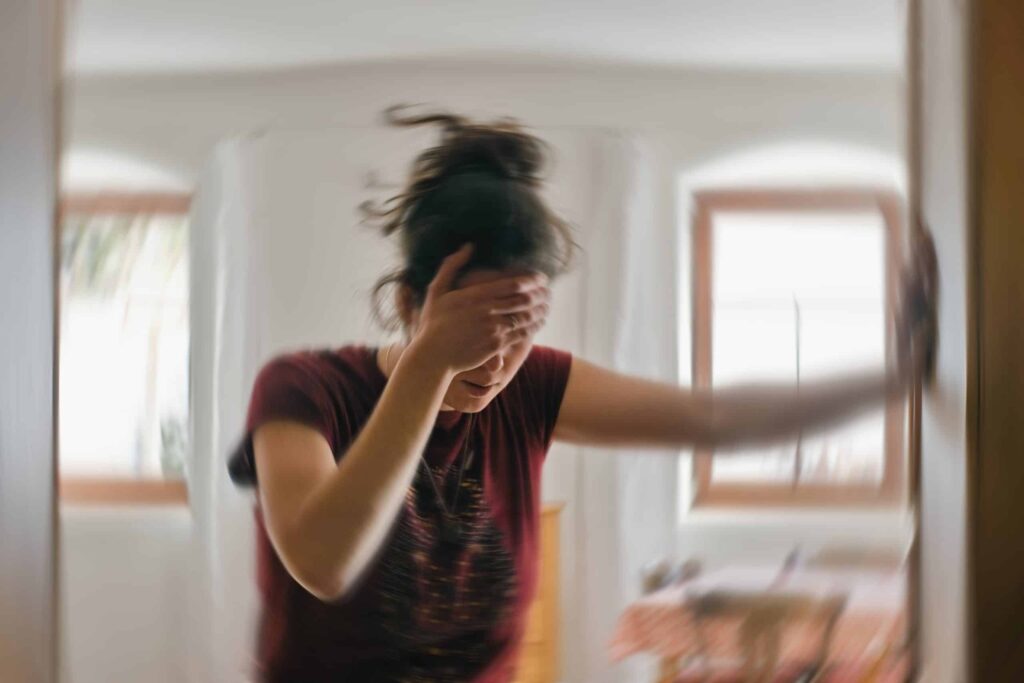COVID-19 has affected millions of people, and we now know the virus has lingering effects and long COVID symptoms. “Long Haul” COVID is now recognized as a significant area of concern. Research in this area suggests that the COVID-19 SARS Virus can cause dizziness and as many as one in five people infected with COVID-19 will experience dizziness and imbalance as a lingering symptom. The length of COVID related dizziness depends on many factors but the sooner the condition is treated, the better.
Understanding what may be causing symptoms post-COVID to benefit from available treatments is essential. The good news is that Physical Therapists specializing in Vestibular Therapy can evaluate the cause of your post-COVID symptoms. Treatment focuses on decreasing dizziness, imbalance, and other related symptoms to allow for a return to pre-COVID levels of function.
Post-COVID symptoms include:
- Dizziness or lightheadedness
- Fatigue
- Imbalance
- General weakness
- Brain Fog
- Visual disturbances and difficulty focusing while in motion
- Vertigo
- Poor concentration and decreased memory
- Decreased overall function
How to treat dizziness after COVID
Physical Therapists specializing in vestibular therapy are healthcare providers that can evaluate and treat your dizziness from COVID. Similar to treating dizziness after a concussion, the assessment includes administering different tests to evaluate the patient’s problems objectively. The healthcare provider or physical therapist will screen the visual and vestibular systems to observe how well-controlled eye movements are.
Testing includes:
- Sensation
- Gathering information about pain
- Muscle strength
- Extremity and spine range of motion
- Coordination
- Posture and balance
- Walking ability
Cardiovascular screening includes:
- Assessment of heart rate
- Oxygen saturation
- Changes in blood pressure with positional changes
Vestibular Physical Therapists can address and successfully treat gait and balance disorders, specifically dizziness from COVID, through exercises performed in the clinic. Post COVID patients are generally treated two to three times per week and given a detailed home exercise program in order to build back balance, muscle strength, and endurance, and address the possible cardiovascular and psychological factors which may be part of the lingering long COVID symptoms. Patient education is provided at every step, and referrals are made based on evaluation findings to treat the complete patient.
How long does dizziness last after COVID?
“Long COVID” is now being researched and studied, and we are in the beginning phases of learning more about the condition. The length of time dizziness can last depends on many factors, including:
- Pre-COVID medical history
- Autoimmune history
- Cardiac history
- Length of hospitalization stay
- Amount of time spent on bed rest
Timely treatment is important, the sooner a patient is evaluated for vertigo symptoms like dizziness, imbalance, and functional deficits, the better. Balance retraining, vestibular rehab, and general strength and endurance training, including respiratory therapy, will help manage symptoms and speed up recovery.
Is it possible to have lingering symptoms of COVID-19?
Yes, below is a list of secondary conditions which may be directly linked to COVID, causing the above symptoms to remain long after the initial viral infection.
Vestibular Neuritis/Labyrinthitis
This term refers to inflammation of the vestibular nerve. It is caused by viral infection or bacterial infection entering the inner ear and causing inflammation or damage to the vestibular nerve in one or both ears. Ischemia, which is the lack of blood flow and delivery of oxygen, can also cause inflammation of the nerve. When this damage occurs, the vestibular nerves send messages to the brain that are no longer balanced between the right and left ear.
People experience a sudden onset of vertigo and imbalance, which may be accompanied by nausea and vomiting. Symptoms of this inner ear disorder are severe and can last days. Dizziness and imbalance can occur for extended periods after the acute phase of vertigo has stopped. In cases of vestibular labyrinthitis, post COVID patients may also experience hearing loss or ringing in the ears.
Ototoxicity
Certain medications can cause damage to the inner ear hair cells. Ototoxicity is ear poisoning that results from exposure to drugs or chemicals that damage the inner ear, often impairing hearing and balance and causing dizziness and other vertigo symptoms. Many chemicals including over-the-counter drugs and prescription medications, can damage the inner ear. Research is finding some medicines used to treat COVID can be harmful to the inner ear, and when coupled with prolonged bed rest, people report motion sensitivity and dizziness as a “Long COVID” symptom.
Central Processing Dysfunction
The central nervous system brain is responsible for taking information from our sensory systems, such as the vestibular system, somatosensory system, and visual system. It uses the information to help us balance and navigate our environments. Any decreased blood flow or oxygen to the central nervous system can cause processing difficulties, and patients often feel off-balance and lightheaded. We know COVID can have immediate impacts on respiration and oxygen intake. Another known complication of COVID is blood clots. These COVID-related complications can cause decreased blood flow to the central nervous system and the vestibular organ.
POTS (Postural Orthostatic Tachycardia Syndrome)
This condition can influence involuntary nervous system functions, such as heart rate and blood pressure, usually upon standing from a reclining position. COVID can affect these autonomic functions causing dizziness and imbalance. Many POTS symptoms are thought to be related to inadequate control of blood flow, causing brain fog and dizziness. Dr. Chung from John Hopkin’s POTS program suspects that COVID may be associated with chronic inflammation in the autonomic nervous system, causing symptoms of dizziness and “brain fog.”
Complications from prolonged bed rest
The vestibular system needs stimulation regularly to stay healthy and strong. Lying in bed for long periods causes decreased effectiveness of the vestibular system. Muscle weakness, decreased coordination, blood pressure regulation issues, and extreme fatigue can cause balance and dizziness symptoms. People report fatigue, motion sensitivity, imbalance, and dizziness after prolonged bed rest. It is crucial to begin a guided course of Vestibular Therapy to improve function and re-introduce motion through gait and balance training.
We’re here to help
If you believe you are suffering from dizziness or other post-COVID syndrome symptoms, visiting a physical therapist can be life-changing. Request an appointment online or find the nearest clinic to schedule an evaluation with a physical therapist specializing in vestibular therapy.
Article By: Robin Evans, PT, DPT, Vestibular Certified Therapist
Vestibular Specialization Program Director
Robin Evans has been a PT for over 20 years and is currently the director of Ivy’s Vestibular Specialization program. She received her Vestibular certification from Emory University in 2003 and has developed vestibular programs on Long Island, incorporating state-of-the-art diagnostic equipment (Frenzel Video System) into her daily care. She currently treats patients in Ivy Rehab Physical Therapy in Lynbrook, NY.





